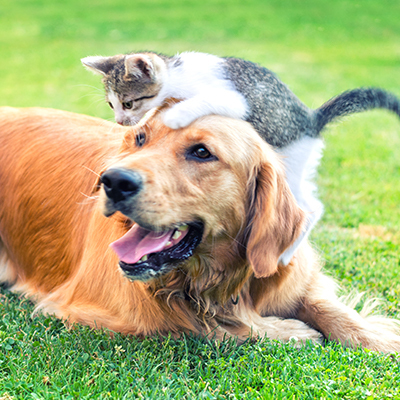Obesity affects 50% of our pets and can have serious consequences for their health. On average an overweight pet will live 2-5 years less than a pet with an ideal body weight. Health problems appear when body fat exceeds 15% above ideal body weight.
Reasons why a pet becomes obese:
- Excessive calorie intake (over-eating)
- Lower metabolic rate due to neutering.
- Inappropriate use of snacks, treats and supplements (human treats and snacks)
- Lack of exercise
- Appetite-stimulating drug therapy ( e.g. steroid treatments)
- Social factors (e.g. multi-pet households)
- Decreased energy requirements e.g. Hypothyroid disease
The effects of Obesity:
Obesity decreases your pets quality of life and puts your pet at risk of one or more of the following:
- Shorter life span!
- Diabetes Mellitus
- Cardiovascular Disease – heart disease
- Degenerative Joint & Orthopaedic Disease (DJD)
- Joint Stress/musculoskeletal Pain
- Exercise intolerance
- Insulin resistance
- Glucose intolerance
- Increased surgical and anaesthetic complications
- Neurological disorders
- Respiratory problems
- Cancer and tumors
- Skin problems
- Premature aging
- Heat Intolerance
- Hypertension -high blood pressure
- Reproductive disorders
- Decreased quality of life
- Susceptibility to infections
Does your pet have a weight problem?
If you answer ‘yes’ to any of the questions below, or if you think your pet is not at its optimum body condition, you may want to talk to us about a weight management program.
- Do you have difficulty feeling your pet’s ribs?
- Is there little or no ‘waist’?
- Do you give your pet table scraps or leftovers?
- Is your pet reluctant to exercise?
- Does your pet seem to tire easily with activity?
- Does your pet waddle when it walks?
- Does your pet keep eating so long as there is food in the bowl?
- Have you been told your pet is overweight?
Weight Management Clinics:
The commitment for your pet to lose weight must come from you and all the family – as you control your pet’s eating habits and exercise.
Top tips for helping your pet lose weight:
- Review your pet’s lifestyle, eating habits and exercise routine.
- Listen to your vet. Obesity can result in sickness such as diabetes, but it can be just as dangerous to suddenly change your pet’s daily routine. We can discuss a program with you, gradually altering your pet’s nutritional requirements according to level of activity.
- Stop snacks and treats. These are the number one cause of obesity in pets. A complete, balanced pet food will provide your pet with adequate nutrition and eating enjoyment. Often we feed our pets snacks because it gives us pleasure. Your pet will only beg for snacks if you have trained it to do so – and it does it to please you!
- Exercise your pet more. Take your pet for lots of nice long walks. They don’t have to be fast walks – you can take it easy. Provided your pet is physically able, exercise is essential to make them happy.
- Keep reviewing how you and your pet are doing – and don’t slip back into bad habits! Come and visit us and see your pet’s weight chart – a useful indicator of how they are progressing.
- Join our FREE Weight Management Clinic.
Weight Management Clinic:
We will be running free Weigh Management Clinics in the New Year.
One of our trained nurses will prepare a weight management program for your pet. We will outline target weight goals and also supply you with a weight chart, a nutritional plan and an exercise program. Your pet’s targets will be based on their age, breed, health and individual needs.
You will also be asked to visit us regularly for free weigh-ins to make sure your pet is on track and to discuss any concerns or queries you may have.
Healthy snacks for your pet:
- Carrots (contain Beta-carotene and aid in weight loss in dogs)
- Cucumbers
- Celery
- Ice cubes (on a hot day)
Unhealthy snacks for your pet:
What a treat for your dog would be equivalent to in human snack terms!
Dog treat = |
Human equivalent |
|
1 x small plain biscuit = |
1 x hamburger |
|
1 x slice buttered toast = |
1 x hamburger |
|
30 g cheddar cheese = |
75g chocolate |
|
100 g sausage = |
6 doughnuts |






Follow us on...